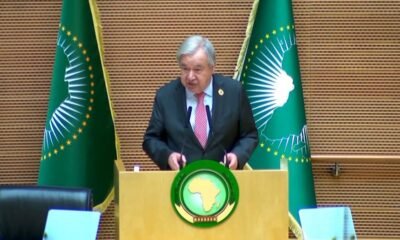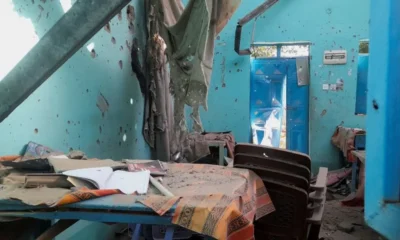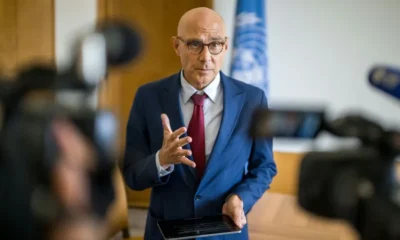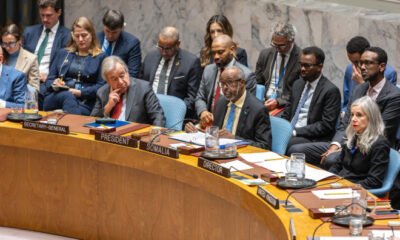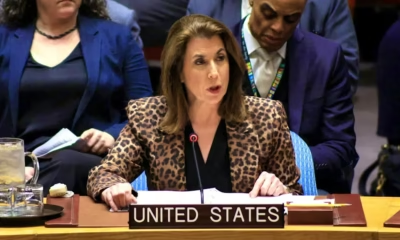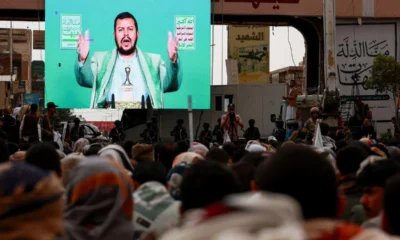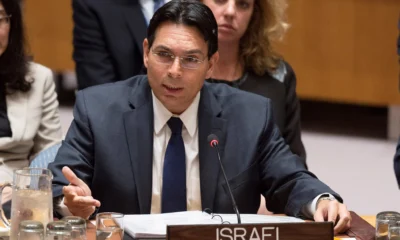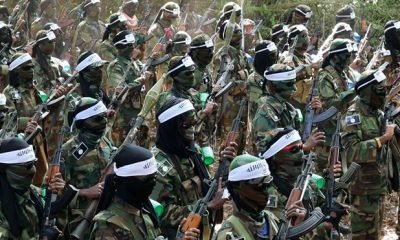Gaza-Israel Conflict
Palestinians living in ‘unbearable’ conditions, UN says
UNRWA Reports Dire Circumstances for Palestinians Amid Ongoing Conflict
The Gaza Strip has long been a focal point of conflict between Israel and Palestinian factions, with the latest escalation beginning with Hamas’s attack on southern Israel on October 7. In response, Israel launched a retaliatory offensive, resulting in extensive destruction and a severe humanitarian crisis in Gaza.
Louise Wateridge, a spokesperson for the United Nations Relief and Works Agency for Palestine Refugees in the Near East (UNRWA), has painted a grim picture of life in Gaza. Describing conditions as “unbearable,” Wateridge detailed how residents are forced to live in bombed-out buildings and makeshift camps surrounded by heaps of trash. The basic necessities of life—water, sanitation, and food—are severely lacking.
The Gaza Strip has been described as “destroyed,” with buildings reduced to skeletons and rubble. Many people are now living in these precarious structures without proper shelter or sanitation. With sanitation services disrupted, waste is accumulating in massive piles near residential areas. This has led to unsanitary conditions, exacerbating the suffering of the population as temperatures rise. The prolonged conflict has led to severe food shortages. The visible health decline among residents, including UNRWA staff, underscores the critical nature of the food crisis.
The limited access to medical care has had devastating effects. Thousands of patients need evacuation for treatment, but logistical challenges and fuel shortages hinder the delivery of aid and the operation of medical services. The humanitarian crisis in Gaza has reached an unprecedented level, with the population facing daily struggles to survive. The destruction of infrastructure, coupled with the blockade and fuel shortages, has rendered basic living conditions intolerable.
The lack of food and medical care is visibly impacting the population, with people showing signs of malnutrition and deteriorating health. The inability to clear waste and provide sanitation services further aggravates the health risks, making the environment hazardous.
The situation in Gaza, as described by the UNRWA, highlights a dire humanitarian crisis that demands urgent attention and action. The combination of infrastructural destruction, food and fuel shortages, and lack of medical care has created conditions that are not just “unbearable” but life-threatening. Immediate international intervention is necessary to alleviate the suffering and prevent further deterioration of living conditions in the Gaza Strip.
Gaza-Israel Conflict
Will Blinken’s 10th Visit Mark a Turning Point in the Israel-Hamas Conflict?

Blinken’s Mission to Israel: The High-Stakes Push for a Gaza Cease-Fire
U.S. Secretary of State Antony Blinken is set to touch down in Israel this Sunday, marking his tenth visit to the region since the onset of the relentless war between Israel and Hamas. His arrival comes as Washington ramps up its diplomatic efforts to broker a cease-fire that could finally halt the 10-month-old conflict.
Blinken’s trip follows a series of intense negotiations involving the United States, Qatar, and Egypt, who have all worked feverishly to bridge the divides between the warring parties. According to a senior Biden administration official, there is a cautious sense of optimism that a deal is within reach. “We’ve addressed the gaps that remained, and we believe the deal is now ready to be closed and implemented,” the official stated.
In Israel, Blinken is expected to engage with Israeli Prime Minister Benjamin Netanyahu and other top officials. The stakes are high, as these discussions occur under the looming shadow of a potential regional escalation. Iran’s recent threats of retaliation following the assassination of Hamas leader Ismail Haniyeh on July 31 have raised fears of further destabilization. The U.S. has strongly warned Iran against any retaliatory actions, emphasizing that such moves could have “cataclysmic” consequences, particularly for Tehran.
The European powers—Britain, France, Germany, and Italy—have thrown their weight behind the cease-fire talks, urging all parties to avoid actions that could exacerbate the situation. Their joint statement reflects a unified front in support of peace efforts and a recognition of the delicate balance required to navigate this crisis.
Yet, even as diplomatic channels buzz with activity, the conflict remains fiercely active. On Saturday, Israeli airstrikes on the Gaza town of Zawayda resulted in the deaths of at least 17 Palestinians, with dozens more wounded. Israeli officials justified the strikes with new evacuation orders, citing ongoing Hamas rocket fire in the vicinity.
The latest phase of the Israeli-Palestinian conflict erupted on October 7, when Hamas launched a devastating assault on Israel, resulting in around 1,200 Israeli casualties and the capture of approximately 250 hostages. In response, Israel’s military campaign has wrought extensive destruction across Gaza, with Palestinian health authorities reporting over 40,000 deaths, predominantly civilians, while Israel claims to have eliminated 17,000 Hamas fighters.
Amid this backdrop of destruction and death, the cease-fire talks face significant hurdles. Hamas spokesperson Jihad Taha has accused Israeli negotiators of introducing additional conditions aimed at derailing progress. Despite Israel’s expression of “cautious optimism” about the potential for an agreement, the reality on the ground remains fraught with tension and uncertainty.
The coming days will be critical as talks continue and senior officials prepare to reconvene in Cairo, where they aim to finalize the deal. Whether Blinken’s latest diplomatic push will yield a breakthrough or simply highlight the enduring complexities of the conflict remains to be seen.
As Blinken arrives and the international community watches closely, the world waits to see if a new cease-fire will emerge from the ashes of this prolonged and devastating war.
Gaza-Israel Conflict
Gallant Signals Resilience of US-EU-Sunni Coalition Against Iran

Despite criticism over Israel’s recent military actions, a coalition of Western and Sunni Arab nations continues to support Israel against Iranian threats.
In a recent briefing to the Knesset Foreign Affairs and Defense Committee, Israel’s Defense Minister Yoav Gallant emphasized the continued resilience of the coalition comprising the United States, European nations, and Sunni Arab countries in countering threats from Iran. This coalition, which came together in April to help defend Israel from potential Iranian aggression, has held firm despite mounting criticism from some Sunni countries over Israel’s recent military actions.
Tensions escalated following Israel’s targeted killings of Hezbollah military chief Fuad Shukr and the attributed killing of Hamas political chief Ismail Haniyeh. These actions sparked significant backlash from key Sunni partners, including Saudi Arabia, Jordan, and Egypt, who had initially supported Israel in its defense against Iran. The criticism primarily revolved around Israel’s decision not to pursue a hostage deal and its subsequent military responses, which these nations believed reignited regional instability.
However, Gallant noted that the coalition’s unity remains intact, largely due to successful diplomatic efforts by Washington. The U.S. has played a critical role in persuading these moderate Sunni countries that maintaining their alliance with Israel is essential, despite their discontent with some Israeli policies. The strategic importance of this coalition is underscored by the geographic complexities Iran faces in attacking Israel, given the lack of a shared border and the necessity of traversing other nations’ airspace.
Adding to the evolving military strategy, Yuli Edelstein, Chairman of the Foreign Affairs and Defense Committee, hinted at a possible shift in Israel’s military focus. He referred to discussions with Gallant about prioritizing the threat from Lebanon, where Hezbollah, Iran’s proxy, poses a significant danger, over the ongoing conflict in Gaza. Gallant has advocated for a potential halt to the Gaza conflict through a hostage deal with Hamas, allowing Israel to concentrate its efforts on the more pressing threat from Lebanon.
While Edelstein did not explicitly endorse this strategic shift, his remarks indicate that the idea is gaining traction within Israel’s defense circles. As the situation develops, the balance of military priorities between Gaza and Lebanon could shape Israel’s broader security strategy in the face of Iranian and Hezbollah threats.
Drugs
Addictions On The Rise In Wartime Israel

As the Gaza war rages, a silent epidemic of drug and alcohol abuse threatens Israel’s youth.
In the heart of Israel, where the echoes of war reverberate daily, another crisis is unfolding in the shadows—one that strikes at the very core of the nation’s youth. Yoni, a 19-year-old from Beersheba, had plans to serve his country in the military, a path chosen by many young Israelis. But those plans were derailed when he found himself spiraling into drug addiction, a struggle that worsened dramatically after Hamas’s brutal attack on October 7.
Yoni’s story is not unique. In the chaotic aftermath of that day, health professionals across Israel have observed a disturbing trend: a sharp rise in drug and alcohol abuse, along with other addictive behaviors. These aren’t just isolated incidents; they signal a growing epidemic, fueled by the relentless stress and trauma of war.
For Yoni, who lost a close friend in the Hamas attack that ignited the current Gaza war, drugs became a way to escape the harsh realities around him. “After the war, it seemed to really get worse,” he admits. What started as recreational use turned into a desperate means of coping, a common response among many who find themselves overwhelmed by grief and fear.
Dr. Shaul Lev-Ran, a psychiatrist and the founder of the Israel Center on Addiction, has witnessed this alarming trend firsthand. “We’ve seen a spectacular rise in the consumption of various addictive substances,” he says, attributing this spike to the emotional toll of living in a war zone. A study conducted by his team found a 25% increase in the use of addictive substances, from prescription medications to illegal drugs and alcohol. This surge is directly linked to the trauma of the October 7 events, which left deep scars on the Israeli psyche.
The numbers are staggering. According to the study, one in four Israelis has increased their use of addictive substances since the war began, a sharp rise from the pre-war figure of one in seven. And this isn’t just about substance abuse. The study also identified a worrying increase in other forms of addictive behavior, such as gambling, as people search for any means to distract themselves from the horrors of war.
The situation is even more dire for those who were closest to the violence. Survivors of the October 7 attack, along with those displaced from their homes near the Gaza border or in the north near Lebanon, are at the highest risk. For them, the proximity to trauma translates directly into an increased likelihood of falling into addiction.
But the crisis doesn’t end with substance abuse. The use of sleeping pills and painkillers has also skyrocketed, with increases of 180% and 70%, respectively. Dr. Lev-Ran recounts the case of a man who, in the midst of the war, demanded something—anything—to help him sleep while his son fought in Gaza. This desperate need for relief is a common thread running through the stories of many Israelis, who are turning to drugs and alcohol to dull the edges of their anxiety and fear.
Even those on the front lines aren’t immune. Matan, a soldier stationed in the Palestinian territories, admits that using drugs helps him “forget” the harsh realities of war. This sentiment is echoed by many of his comrades, who find solace in substances that temporarily mask their pain.
For Yoni, the descent into addiction was swift. What began as taking “party drugs like ecstasy, MDMA, LSD” to stave off boredom and fear soon escalated into a solitary habit, a private battle fought within the confines of his home. It was only when he hit rock bottom that Yoni realized the depth of his problem and sought help, entering rehab in a bid to reclaim his life.
Now, Yoni is determined to recover and fulfill his original goal of serving in the military. “I need to go to rehab,” he says with conviction, “to prove to myself, prove to the family, that I am indeed capable of more, and [can] contribute to the community like everyone else.”
As Israel continues to grapple with the physical and emotional toll of the Gaza war, the country faces a looming epidemic of addiction. It’s a crisis that threatens to undermine the resilience of a nation already pushed to its limits by conflict. The question now is whether Israel can confront this hidden battle with the same resolve it has shown on the battlefield—or whether this wave of addiction will become the lasting legacy of a war that has already claimed so much
Gaza-Israel Conflict
Hamas’ New Leadership Deepens Gaza Conflict, Dims Hopes for Cease-Fire

Yahya Sinwar’s Rise Signals a Grim Future for Gaza, As Regional Tensions Escalate
The ascension of Yahya Sinwar, the man behind the deadly October 7 attacks on Israel, as Hamas’ new political chief is sending shockwaves through the Middle East. His dual role as both the political and military leader in Gaza signals a seismic shift in the Palestinian terror group’s strategy. Sinwar’s rise is not just a change of leadership; it’s a bold declaration that Hamas is prepared to fight to the bitter end, regardless of the cost. The possibility of a cease-fire to end the brutal conflict in Gaza now seems more distant than ever.
Analysts are sounding the alarm: Sinwar is unlikely to broker any cease-fire deal with Israel, despite the ongoing negotiations. The message is clear—Gaza, not Qatar, is now the heart of Hamas’ operations. The decision to appoint Sinwar unanimously underscores this shift, making it evident that Hamas’ path is firmly rooted in Gaza’s tumultuous landscape. Nicholas Heras of Washington’s New Lines Institute suggests that Hamas is making a loud statement, not just to Israel and the U.S., but to the entire world, that Gaza’s future is inseparable from Hamas’ survival and its militant agenda.
Israeli Foreign Minister Calls for Death of New Hamas Leader
This grim outlook has not gone unnoticed by global powers. U.S. Secretary of State Antony Blinken pointedly remarked that the responsibility for any cease-fire now rests squarely on Sinwar’s shoulders, implying that even under previous leadership, Sinwar was the true power behind Hamas’ military strategies. His grip on power signals a more radical Hamas, one less interested in negotiation and more intent on pursuing a hardline approach.
Khaled Hroub, a Hamas specialist, warns that if Israel, the U.S., and their allies believed they could weaken Hamas by force, they’ve only succeeded in hardening its resolve. Hroub predicts a more radical Hamas, less open to diplomatic solutions, as the conflict escalates. As Washington and Qatar scramble to broker peace, they face the harsh reality that Hamas is no longer swayed by traditional diplomatic pressures. The real puppeteer behind Hamas’ moves is Iran, not the mediators in Doha.
Cinzia Bianco, an expert on Gulf affairs, sheds light on the diminishing influence of Qatar in the region. Despite its eight-month-long efforts to secure a deal, it’s clear that Hamas takes its marching orders from Tehran. Sinwar’s leadership has effectively merged the political and military wings of Hamas, reducing Qatar’s leverage to mere background noise in a conflict driven by Iran’s agenda and perhaps even influenced by other global players like Russia and China.
Israeli and U.S. intelligence paint a chilling picture of Sinwar’s long-term strategy: keep the war going until Israel’s global standing is in tatters and its relationship with the United States is severely strained. This isn’t just a fight for territory—it’s a calculated effort to undermine Israel on every front, following the playbook of slain Iranian General Qassem Soleimani. Sinwar’s tactics echo Soleimani’s strategy to encircle Israel with hostile forces, aiming to bleed it slowly over time.
The implications are staggering. This conflict is no longer just about Gaza; it’s a proxy war with far-reaching consequences. Observers are increasingly convinced that neither Sinwar nor Israeli Prime Minister Benjamin Netanyahu are willing to seek a cease-fire, each driven by their own political motivations. As the conflict drags on, the prospect of peace seems more elusive, with Gaza’s future hanging in the balance.
The question now is whether the world can afford to let this conflict spiral further, or if a new approach is needed to break the deadlock. The stakes have never been higher, and with Sinwar at the helm, the path forward looks more perilous than ever.
Gaza-Israel Conflict
Israeli Foreign Minister Calls for Death of New Hamas Leader

Appointment of Yahya Sinwar Sparks Controversy and Raises Fears of Expanded Conflict
Israel’s Foreign Minister Israel Katz has called for the death of Yahya Sinwar, the newly appointed leader of Hamas. This announcement comes as Israel braces for possible retaliation from Iran following a series of high-profile assassinations. Katz’s incendiary remarks, made on X, reflect the deepening crisis as Israel and its adversaries gear up for potential clashes.
Katz minced no words in his condemnation of Sinwar, labeling him an arch-terrorist and asserting that his appointment is a compelling reason to swiftly eliminate him and dismantle Hamas. “The appointment of Sinwar sends a clear message to the world that the Palestinian issue is now completely controlled by Iran and Hamas,” Katz stated, underscoring the perceived threat posed by the new Hamas leadership.
This leadership change follows the assassination of Ismail Haniyeh, the previous Hamas leader, in Tehran last week—a killing for which Israel has not officially claimed responsibility. Nevertheless, Haniyeh’s death on July 31 prompted Iranian leaders to blame Israel and vow retribution, further stoking fears of an imminent backlash.
Sinwar’s rise to power is particularly provocative given his role as one of the architects of the October 7 terror attack on Israel, an event that has left deep scars and a fierce determination for retribution within Israel. Katz’s call to action is a stark reminder of the volatility in the region and Israel’s unwavering stance against perceived threats.
Katz also emphasized the necessity for Israel to maintain its security control over the West Bank to prevent Iran from establishing another extremist stronghold. “Anything else will lead to the creation of another Iranian outpost in the region, which will explode in the face of the world and all regional countries,” Katz warned. Israel’s military operations in the West Bank, which it claims are aimed at disrupting militant activities, have resulted in approximately 600 deaths since the war in Gaza began in October.
Compounding the tension, Hezbollah’s leader has vowed retaliation for Israel’s recent killing of one of its commanders, Fouad Shukur, in Beirut. This development has fueled international fears of a broader regional conflict. U.S. Secretary of State Antony Blinken has urged all parties to make decisions that will de-escalate tensions rather than exacerbate them. “Further attacks only perpetuate conflict, instability, insecurity for everyone,” Blinken warned, advocating for a cease-fire as the only path to peace in Gaza.
The White House is actively working to mediate a cease-fire, with President Joe Biden engaging in talks with Egypt’s President Abdel Fattah el-Sissi and Qatar’s Amir Sheikh Tamim Bin Hamad Al-Thani. The leaders emphasized the urgency of bringing the cease-fire process to a swift conclusion.
Israel has vowed to destroy Hamas in retaliation for the October 7 attack, which killed 1,200 people and resulted in the capture of 250 hostages. The subsequent Israeli counteroffensive has resulted in nearly 40,000 deaths in Gaza, predominantly women and children, according to Gaza’s Health Ministry. Israel, however, maintains that thousands of Hamas fighters are among the dead.
As the region teeters on the brink of wider conflict, the world watches with bated breath. Katz’s provocative call for Sinwar’s death has added fuel to an already volatile situation, raising critical questions about the future of peace and stability in the Middle East. The international community’s response and the actions of the involved parties in the coming weeks will be crucial in determining whether this crisis will escalate further or move towards a tenuous calm.
Gaza-Israel Conflict
UN Investigation Uncovers Possible Involvement of Nine Staffers in October 7 Attack

UNRWA Faces Scrutiny and Funding Suspensions Amid Findings of Staffers’ Potential Terrorist Ties
A United Nations internal investigation has concluded that nine of 19 Palestinian staffers accused by Israel “may have been involved” in the terror attacks on October 7 in southern Israel. These findings have prompted the termination of their employment by the U.N. agency that assists Palestinian refugees, UNRWA.
UN deputy spokesperson Farhan Haq announced the conclusion of the investigation, conducted by the Office of Internal Oversight Services (OIOS), stating that the employment of the implicated individuals will be terminated “in the interests of the agency.” The investigation, which spanned several months, found insufficient or no evidence regarding the remaining ten staffers.
“The employment of these individuals will be terminated in the interests of the agency,” Haq stated to reporters, marking a significant step in response to the severe allegations.
The probe began after Israel accused 19 UNRWA employees of involvement in the attacks. Of these, nine were found to have possible ties, while the remaining cases lacked sufficient evidence to confirm their involvement. “Appropriate measures will be taken in due course, in conformity with UNRWA regulations and rules,” Haq noted, without providing further details.
The accusations and subsequent investigation have cast a long shadow over UNRWA, which plays a crucial role in supporting over two million Palestinians in Gaza. The agency’s credibility took a hit when more than a dozen donor states, including its largest funder, the United States, suspended their financial support following the initial allegations in January.
Israel’s UN ambassador, Gilad Erdan, dismissed the investigation’s findings as “too little and too late,” calling for the immediate shutdown of UNRWA and the resignation of the UN secretary-general. “Israel needs to act quickly now to outlaw UNRWA, declare it a terrorist organization and expel its leaders from Israeli territory and not allow them to enter,” Erdan urged, intensifying the diplomatic friction.
The Israeli parliament is currently considering a bill to designate UNRWA as a terrorist organization, which, if passed, would significantly alter the agency’s operations and influence in the region.
UNRWA Commissioner General Philippe Lazzarini reiterated his condemnation of the October 7 attacks and called for the immediate release of all hostages. “UNRWA is committed to continue upholding the fundamental principles and values of the United Nations, including the humanitarian principle of neutrality, and to ensuring that all its staff abide by the Agency’s policy on outside and political activities,” Lazzarini emphasized.
The investigation faced significant challenges, as noted by UN spokesperson Haq. The evidence provided by Israel remained largely unverified due to security concerns preventing investigators from traveling to Gaza. Instead, some accused individuals provided video statements responding to the allegations.
Haq clarified that the UN investigation was not a criminal probe but a fact-finding mission to determine if internal administrative rules had been violated and to recommend appropriate disciplinary actions. The confidential report was submitted to Secretary-General Antonio Guterres on July 31.
Despite the controversy, most donor states resumed funding to UNRWA following an independent review of the agency’s neutrality by former French foreign minister Catherine Colonna in April, with the notable exception of Washington.
UNRWA, which employs about 13,000 Palestinian staffers in Gaza, has faced devastating losses since the conflict erupted in October. Over 200 staffers have been killed, and the war has resulted in nearly 40,000 Palestinian deaths, according to Gaza’s health ministry, a figure that does not differentiate between combatants and civilians.
As the international community grapples with these findings, the future of UNRWA and its critical humanitarian mission hangs in the balance, with potential repercussions for the fragile stability in the region. The investigation’s results have not only intensified calls for accountability but also spotlight the complex dynamics at play in the protracted Israeli-Palestinian conflict.
Gaza-Israel Conflict
Drone Strike by Houthi Rebels kills 1, Wounds at least 10 in Tel Aviv
US, Israel Discuss Drone Strike by Iran-Backed Rebels on Tel Aviv
In a shocking escalation of regional tensions, Iranian-backed Houthi rebels launched a devastating drone attack on Tel Aviv, killing one and injuring at least ten others. The predawn strike, which damaged buildings near the U.S. Embassy, has prompted a fierce response from both Israel and the United States, underscoring the volatile security situation in the Middle East.
U.S. Defense Secretary Lloyd Austin swiftly reached out to his Israeli counterpart, expressing heartfelt condolences and reiterating Washington’s “ironclad commitment to Israel’s security and Israel’s right to self-defense.” This firm stance highlights the deep strategic partnership between the two nations, especially in the face of growing threats from Iranian proxies.
In a dramatic televised address, Israeli military spokesperson Daniel Hagari revealed that the drone, identified as an Iranian Samad-3, had likely been upgraded to extend its range, making the 1,600-kilometer journey from Yemen. This revelation underscores the evolving threat posed by Iran’s technological advancements in unmanned aerial vehicles.
Compounding the gravity of the situation, an Israeli military official admitted that the drone was detected but not intercepted due to “human error,” a stark reminder of the fallibility of even the most sophisticated defense systems. “The defense is not impenetrable,” Hagari candidly told reporters, vowing to bolster air patrols and refine defense capabilities to better protect Israeli citizens.
Adding to the intrigue, Israel is investigating a potential connection to another drone attack. Officials suspect this second drone, intercepted near the Israeli border, might signal a coordinated effort to destabilize the region.
President Joe Biden, briefed on the attack, has renewed concerns about Houthi capabilities. The Houthis, asserting solidarity with Palestinians in Gaza, claimed responsibility, a move U.S. officials dismiss as a cover for their broader disruptive agenda, which has already impacted humanitarian efforts in Yemen and Sudan and raised global shipping costs.
Despite multiple U.S. airstrikes aimed at curbing Houthi aggression, these attacks have persisted. Joint Chiefs Chairman General CQ Brown acknowledged the challenge, emphasizing the need for a comprehensive strategy beyond military action. “It’s going to take more than just a military campaign to take the Houthis off track,” he asserted, hinting at the complex geopolitical maneuvers at play.
Secretary of State Antony Blinken, speaking at the Aspen Security Forum, hinted at a breakthrough in negotiations for a Gaza cease-fire, tantalizingly close yet fraught with last-minute hurdles. “We’re inside the 10-yard line,” Blinken quipped, though he warned that the final stretch is often the hardest.
The stakes are high, with U.S. officials adamant that any deal must prevent Hamas from regaining power and avoid prolonging Israel’s military operations. The ongoing conflict, ignited by Hamas’s brutal October 7 attack that killed 1,200 Israelis and captured 250 hostages, has seen Israel’s counteroffensive result in over 38,200 Palestinian deaths, according to Gaza’s health ministry.
National Security Adviser Jake Sullivan, also speaking at Aspen, stressed the complexities of achieving a cease-fire, balancing the political, psychological, and practical challenges. Yet, he remained cautiously optimistic, looking ahead to Israeli Prime Minister Benjamin Netanyahu’s upcoming visit to Washington as a potential turning point.
As the world watches, the drone strike on Tel Aviv and the subsequent diplomatic maneuvers underscore the fragile, high-stakes nature of Middle Eastern geopolitics. The relentless march of technology, the shadow of Iranian influence, and the enduring human cost of conflict paint a sobering picture of a region on the edge. The U.S. and Israel’s response will be crucial in shaping the next chapter of this unfolding drama, as global powers grapple with the ever-present specter of instability.
Gaza-Israel Conflict
Israel strikes southern Lebanon after Hezbollah rocket attack

Cross-border attacks between Israel and Hezbollah intensify as Gaza conflict threatens to expand regionally.
The border between Israel and Lebanon saw a dramatic escalation in hostilities on Thursday, as Israeli forces and the Lebanon-based militant group Hezbollah engaged in a fierce exchange of aerial attacks. This latest flare-up, part of months-long confrontations, has raised serious concerns about the ongoing Israeli war against Hamas in the Gaza Strip potentially spilling over into a broader regional conflict.
Hezbollah announced it had launched over 200 rockets at Israeli military bases, deploying “explosive drones” in response to Israel’s assassination of one of its commanders the previous day. The assault triggered air raid sirens across northern Israel. The Israeli military reported intercepting many of the rockets while launching retaliatory airstrikes on Hezbollah’s launch sites in Lebanon.
These attacks unfolded as Israeli officials deliberated over Hamas’s response to a new cease-fire proposal, which includes the release of hostages held in Gaza. Prime Minister Benjamin Netanyahu’s office disclosed that Israel is considering “some ideas” communicated by Hamas to Qatari mediators.
On Thursday, an Israeli government official revealed that a delegation had been dispatched to negotiate a hostage release deal with Hamas. Meanwhile, Netanyahu prepared for a crucial meeting with his security cabinet to review Hamas’s new positions regarding the cease-fire.
Israeli media reported that Netanyahu held a conversation with U.S. President Joe Biden on Thursday. Biden, who has been striving to broker a truce for months, supported Netanyahu’s decision to send negotiators to work with U.S., Qatari, and Egyptian mediators to finalize the deal.
“The President welcomed the Prime Minister’s decision to authorize his negotiators to engage with U.S., Qatari, and Egyptian mediators in an effort to close out the deal,” the White House stated, reaffirming Biden’s strong commitment to Israel’s security amid threats from Iranian-backed groups like Hezbollah.
The mediating countries — Qatar, Egypt, and the United States — have been tirelessly working to secure a deal that would free hostages and cease hostilities. Hamas’s latest proposals align with a three-phase plan Biden introduced in late May.
In parallel, the United Nations expressed deep concern over Israel’s recent evacuation order affecting significant portions of the Khan Younis and Rafah governorates, impacting up to 250,000 civilians. Andrea De Domenico, head of the U.N. office for humanitarian affairs in the Palestinian territories, highlighted the massive displacement this order has caused. “What we saw in the last two days is a constant flow of people moving out,” De Domenico reported from Jerusalem.
He described the operational challenges faced by U.N. agencies and their partners due to the evacuation, noting the daily struggle to deliver aid. Israel has repeatedly urged Palestinians to leave certain areas ahead of military offensives, ostensibly to protect civilians. However, these evacuations have led to repeated displacements for many.
De Domenico pointed out that 90% of Gaza’s population has been displaced at least once, and some as many as ten times, since the war between Israel and Hamas erupted in October. He emphasized the dire conditions in the designated “safe zones” along the coast, which are overcrowded and lack basic amenities.
“Nowhere and no one is safe in Gaza,” he warned. “We have seen over and over military operations and bombardment happening also in the heart of the humanitarian safe zone declared by Israel.”
The conflict, ignited by a Hamas-led militant attack on southern Israel on October 7, resulted in around 1,200 Israeli deaths and the abduction of over 250 hostages, predominantly civilians. Israel’s retaliatory campaign has led to more than 38,000 deaths and 87,000 injuries in Gaza, according to the enclave’s health ministry, leaving the region devastated.
As the situation deteriorates, the possibility of a broader regional conflict looms, with international mediators striving to navigate a path to peace amidst the rising tensions.
-

 Somaliland1 month ago
Somaliland1 month agoF-35s Over Hargeisa: The Night Somaliland’s Sovereignty Went Supersonic
-

 Somalia2 months ago
Somalia2 months agoAid Destroyed, Trust Shattered: Somalia Loses U.S. Support for Good
-

 Terrorism2 months ago
Terrorism2 months agoForeign ISIS Pipeline Exposed: Puntland Captures Dozens of Non-Somali Fighters
-

 Somaliland1 month ago
Somaliland1 month agoSomaliland at Davos: The Moment Somaliland Entered the World’s Inner Circle
-

 Terrorism1 month ago
Terrorism1 month agoAmerica Pulls Back From Somalia but Doubles Down Next Door
-

 Opinion2 months ago
Opinion2 months agoTurkey’s Selective Morality: From the Ruins of Gaza to the Red Sea
-

 Middle East2 months ago
Middle East2 months agoUS War Plans Against Iran Enter Advanced Stage
-
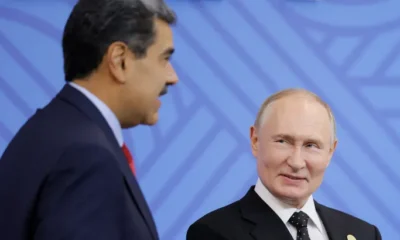
 Analysis2 months ago
Analysis2 months agoWhy Putin Is Silent on Maduro’s Abduction—and the Limits of Putin’s Power


